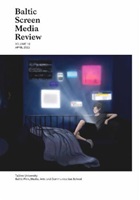Cinematographers’ Perceptual Professionalization from Novices to Experts: Observations from an Eye-tracking Case Study
Cinematographers’ Perceptual Professionalization from Novices to Experts: Observations from an Eye-tracking Case Study
Author(s): Elen Lotman, Mati Mõttus, Pia TikkaSubject(s): Cognitive Psychology, Film / Cinema / Cinematography, Sociology of Art, History of Art
Published by: Tallinna Ülikooli Balti Filmi- ja Meediakool
Keywords: cinematography; perceptual learning; embodied mind; neurocinematics; eye-tracking;
Summary/Abstract: Cinematographers represent a group of experts whose professional skills depend to a great extent on their visual perceptual abilities. By the term perceptual professionalization, we emphasize the embodied dynamics of perceptual learning processes that shape the ways in which cinematographers make creative decisions during their daily practices. Novice cinematographers are initiated in film schools and during assisting jobs to a range of technical skills required for working as heads of the camera department in film productions. However, honing one’s perceptual skills as a professional cinematographer is nothing less than a lifelong process. While scientific studies show evidence for behavioral and physiological differences between experts and novices in many different fields, so far no such studies exist between professional cinematographers and novices. As a starting point for studying how cinematographers’ perceptual learning evolves from the level of novice to that of experienced professional, we assumed that the different expertise levels of cinematographers can be observed in the way they view moving images. We then conducted an eye-tracking case study where we identified differences in the gaze patterns between film professionals with different levels of expertise in cinematography during viewing a film trailer. As the experiential heuristics of creative decisionmaking of professional cinematographers largely rely on the practical skills accumulated in film work, in order to gain access to such knowledge, we also report how involving a practicing cinematographer both in designing the study and in analyzing the results provided us new insights to the topic under scrutiny. Based on our findings, a new study protocol is proposed.
Journal: Baltic Screen Media Review
- Issue Year: 2023
- Issue No: 11
- Page Range: 172 - 197
- Page Count: 26
- Language: English

